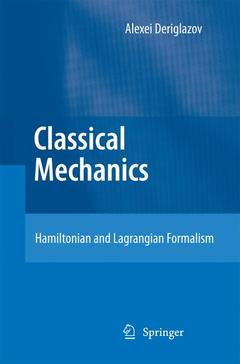Description
Classical Mechanics, 2010
Hamiltonian and Lagrangian Formalism
Author: Deriglazov Alexei
Language: English
Approximative price 195.16 €
In Print (Delivery period: 15 days).
Add to cart
Publication date: 11-2014
Description
/li>Contents
/li>Comment
/li>
Formalism of classical mechanics underlies a number of powerful mathematical methods that are widely used in theoretical and mathematical physics. This book considers the basics facts of Lagrangian and Hamiltonian mechanics, as well as related topics, such as canonical transformations, integral invariants, potential motion in geometric setting, symmetries, the Noether theorem and systems with constraints. While in some cases the formalism is developed beyond the traditional level adopted in the standard textbooks on classical mechanics, only elementary mathematical methods are used in the exposition of the material. The mathematical constructions involved are explicitly described and explained, so the book can be a good starting point for the undergraduate student new to this field. At the same time and where possible, intuitive motivations are replaced by explicit proofs and direct computations, preserving the level of rigor that makes the book useful for the graduate students intending to work in one of the branches of the vast field of theoretical physics. To illustrate how classical-mechanics formalism works in other branches of theoretical physics, examples related to electrodynamics, as well as to relativistic and quantum mechanics, are included.
Sketch of Lagrangian Formalism.- Hamiltonian Formalism.- Canonical Transformations of Two-Dimensional Phase Space.- Properties of Canonical Transformations.- Integral Invariants.- Potential Motion in a Geometric Setting.- Transformations, Symmetries and Noether Theorem.- Hamiltonian Formalism for Singular Theories.
With worked examples, 55 end of chapter exercises and chapter summaries The equivalence of various definitions of the canonical transformation is proved explicitly, in contrast to competing books Discussion of (global) symmetries and the Noether theorem in the framework of classical mechanics gives a new approach not covered by most mechanics textbooks Includes supplementary material: sn.pub/extras
© 2024 LAVOISIER S.A.S.
These books may interest you

MechanicsAn Intensive Course 84.39 €



